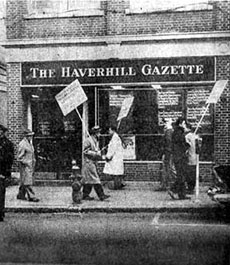Walter Cronkite, anchorman of the CBS Evening News.
…findings potentially point to a problem in local journalism, in which lower-income communities may be underserved relative to wealthier communities.
A Series Examining the Evolution of Local News
Part 2 of a 5-part series
This series examines the evolving and lasting role of local news reporting, effects of WHAV’s unique entrepreneurial approach in shaping a competitive market, intersection of cutting edge and traditional technologies, importance of looking back in order to move forward and a bold vision of the future that offers advantages for residents now.
By Tim Coco
President and General Manager
Competition is interesting. A little of it makes products better, but too much of it can kill those same offerings.
In news reporting, competing media keeps the pressure on the players not to miss a story or else be scooped. It also raises the quality of coverage and quells the temptation to hide facts that may be embarrassing to friends of publishers. With healthy competition in the wings, any untoward conduct will be reported by opposing camps. Late CBS Evening News Anchor Walter Cronkite, once dubbed “the most trusted man in America,” worried about the loss of competition.
“I think it is absolutely essential in a democracy to have competition in the media, a lot of competition, and we seem to be moving away from that,” Cronkite told John Nichols, national affairs correspondent for The Nation magazine, as reported in July, 2009.
WHAV’s expanded news operation delivers the benefits of competition to Greater Haverhill. Not only do residents learn of more local stories from WHAV, more of them are also being reported by other media.
Quality of reporting is improving too. When WHAV learns of criminal wrongdoing, for example, it takes the time to investigate the backgrounds of the culprits involved. It was WHAV that first reported an Andover man, accused of stealing his late father’s Social Security checks, was also a state employee—exposure of his taxpayer-paid employment led to his dismissal (https://whav.net/andover-man-pleads-guilty-to-stealing-govt-benefit-checks/). Similarly, WHAV first identified the job of what would turn out to be a Haverhill basketball coach as a man indicted in connection with a “multimillion dollar sports betting operation (https://whav.net/necc-basketball-coach-indicted-in-sports-gambling-scheme/).” The latter story forced a competitor to reissue its story and include the missing local connection. WHAV remains the only local media to report on a Haverhill District Court case involving a man accused of his abusing his wife who later died (https://whav.net/georgetown-man-held-without-bail-following-wifes-death/).
WHAV, however, is not infallible. If it misses a story vital to its audience, the policy is to confirm and report the news soon thereafter instead of ignoring its existence. Some stories reported exclusively by WHAV later appear elsewhere in greater detail—something known in the industry as a “second day angle.” This is how residents benefit from competition. A story that otherwise might not have been reported at all, but for WHAV, receives deeper coverage.
WHAV’s primary audience is residents of Haverhill. It realizes it cannot fully cover every surrounding town without diluting the quality of coverage to its core constituents. This being said, WHAV makes an effort to touch on Andover and Methuen, Mass., and Plaistow and Sandown, N.H., where residents in those communities receive WHAV on their cable television systems. Once WHAV’s new FM station signs on, coverage will expand to those in the listening range.
The Downside of Competition

A strike by Haverhill Gazette composing room workers presented an opening for the Haverhill Journal to begin publishing.
Ultimately, someone has to pay for journalism. It may be the audience through subscriptions—memberships in the case of non-profit WHAV, or advertisers.
During the early 1980s, the former Lawrence Eagle-Tribune opened a newspaper office in Haverhill and gave the Haverhill Gazette its first real newspaper competitor in 20 years. The result was predictable. As early as 1959, U.S. District Court Judge Charles E. Wyzanski said two quality newspapers in the Haverhill market could not survive in the face of competition.
“Undoubtedly it is possible to run at a profit in Haverhill two or more daily newspapers of limited news coverage and of inferior general quality. But the type of newspaper which The Haverhill Gazette has been for many years, which The Haverhill Journal has been since it began publication…could not succeed financially as a wholly independent enterprise unless either it had no rivals or had in the face of rivalry a circulation of over 15,000,” he said during the fierce anti-trust legal battle between the Gazette and its last major competitor, the Haverhill Journal. During both battles involving the Haverhill Gazette, WHAV also drew advertising revenues away from the precarious market.
The Haverhill Gazette survived the first battle when the Haverhill Journal closed in 1965, but it was reduced to a weekly after it was purchased by the Eagle-Tribune family in 1998. From 1995 to 2004, WHAV also disappeared from the market during an investor-led wave of deregulation. Finally, the last Haverhill newspaper office closed in 2012. During the interim, and combined with pressures facing the newspaper industry, local news suffered.
Competition brings better news coverage, but it can also lead to reduced reporting if the local economy cannot support it. A 2015 report, analyzing news efforts in three New Jersey communities, warns relatively poor communities may not be able to afford the democratic benefits of vibrant news reporting.
“While it is difficult to generalize from a study of only three communities, these findings potentially point to a problem in local journalism, in which lower-income communities may be underserved relative to wealthier communities,” said the report prepared for the Democracy Fund, the Geraldine R. Dodge Foundation and the John S. and James L. Knight Foundation.
An Entrepreneurial Approach
While the newspaper industry deals with its demons and others slowly contemplate a path forward, WHAV has acted swiftly and decisively. It was passionately determined to effect change, took risks by establishing a new Web-based news service and seeking an FM license, demonstrated confidence in its undertakings, adapted to market conditions and embraced new means of getting the job done.
These are the traits of an entrepreneur, according to late Harvard Business Review Editor Theodore Levitt.
“Creativity is thinking up new things. Innovation is doing new things,” he said.
WHAV offers an entrepreneurial news operation with a bold, but yet simple vision: ensure residents receive adequate information to make life choices, participate effectively in the democratic process and make decisions in their own best interests.
WHAV’s innovative use of technology means more people receive their local news from WHAV than from all other sources combined. It’s no wonder there are now about five million visits to WHAV.net each month.
Help WHAV “Make Waves” and Bring Local News to FM
 Tom Bergeron, honorary chairperson of WHAV’s “Make Waves” campaign, is asking for your help in raising at least $100,000 to put Haverhill’s own FM radio station on the air. A rare window of opportunity has opened that could put WHAV on FM sooner than anticipated, but it is dependent on your generosity. Please support the only Haverhill-based news source that’s always free with your donation by clicking here (https://gofundme.com/mjp130).
Tom Bergeron, honorary chairperson of WHAV’s “Make Waves” campaign, is asking for your help in raising at least $100,000 to put Haverhill’s own FM radio station on the air. A rare window of opportunity has opened that could put WHAV on FM sooner than anticipated, but it is dependent on your generosity. Please support the only Haverhill-based news source that’s always free with your donation by clicking here (https://gofundme.com/mjp130).
Tomorrow: Part 3: Intersection of Technologies Benefits Public

I was excited about this series at first but this seems like a long winded, subjective advertisement for WHAV.
Tim, as a ‘community’ newspaper WHAV is doing a great job and providing a valuable service. This is especially true in light of the fact that The Eagle Tribune is in bed with local politicians to report only what ‘they’ deem appropriate. What I struggle with about WHAV is its role in ‘educating’ readers and essentially connecting the dots to what it is being reported. For example, any time a housing complex of any kind is proposed in this city no mention is made of the impact that has on the city schools or taxpayers. It now costs taxpayers $16,000.00 to educate just one student in Haverhill schools. With an average property tax bill being about $4,000.00 that means Haverhill taxpayers foot a bill of $12,000.00 for every child in a household. With the average household having two children this means that for EVERY house built in this city the tax burden on taxpayers goes up $24,000.00 per year. Asking those in city government ‘on the record’ what their position is on this, and then reporting it, leads to a high level of accountability… something that is missing in this city.
“leads to a high level of accountability… something that is missing in this city.” –
That’s because all roads lead to Beacon Hill.
Where money is concerned, that road begins and ends with Chair of Ways & Means Brian Dempsey. Even though The Merrimack Valley has a disproportionate ratio of failed cities in economic and mathematical ruin, Dempsey et al. exacerbates the problem through legalized larceny and further encouragement of crony capitalism. We know Beacon Hill doesn’t like transparency (see open records laws), we know Haverhill has a long storied history of public corruption, yet voters, the few that there are, continue to vote for this paradigm. It can be argued The People do in fact get the government they deserve.
On thing that stands out in Massachusetts, especially Haverhill, is the old cliche’: “Follow the money” You don’t have to care what politicians and their allies say, “pay-to-play” is the only game in town, it is what they do and how they vote. Invariably it is the crony connected few that benefit at the expense of the many in this city and this state. Protected by a Political Cartel that no matter how corrupt, or the appearance thereof, will never acknowledge such even in light of glaring evidence. Their answer of course is ALWAYS: “It’s legal” – Only made so by the legislative powers that be.
Maybe someday an equal rule of law will return, but that day will not be today.